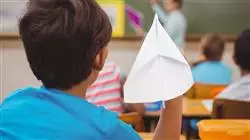University certificate
The world's largest faculty of education”
Introduction to the Program
Learn to identify and analyze conflicts that arise in classrooms and school environments as an initial step to promote conflict resolution, with this high-quality Postgraduate certificate"

This program offers an integral vision of classroom conflict resolution as well as of successful approach models, and provides tools, experiences and advances in the area that have been approved for this program by a specialized teaching faculty, all of them practising professionals. Each teacher will learn based on professional experience, as well as on evidence-based pedagogical methods, which will make students’ learning process more effective and specific.
Mediators possess skills that teachers can cultivate to serve as intermediaries between students and the learning institution; the educator’s intention would be to encourage and facilitate this process, so that students can reach their objectives. Mediation in the education system is an emerging skill that can bring improvement in teachers and students, which will result in academic as well as humanistic learning for relationship management in this area.
The perspective from the emerging educational paradigm must be inclusive and based on a biopsychosocial model that contemplates attention to diversity from a comprehensive approach aimed at the entire educational community.
Teachers, at all educational stages, and related professionals in both the educational and socio-health fields need to know the characteristics of these students, know how to identify their needs and have the knowledge and tools to intervene at a personal, socio-familial and, above all, educational level.
This program, designed as a Postgraduate certificate, responds to the demand for continued specialization among educational agents, and is directed mainly at teachers of kindergarten, primary, secondary and post-compulsory education. With this program, teachers will acquire skills to manage classroom conflict and diversity in the educational context, and to adjust attention to diversity and educational projects in their schools, while it will also enable them to create mediation plans for these centers.
A highly specialized Postgraduate certificate that will propel you to an optimum level of competitiveness in teaching"
This Postgraduate certificate in Classroom Conflict Analysis contains the most complete and up-to-date program on the market. Its most important features include:
- The latest technology in online teaching software
- Intensely visual teaching system, supported by graphic and schematic contents, easy to assimilate and understand
- Practical cases presented by practising experts
- State-of-the-art interactive video systems
- Teaching supported by telepractice
- Continuous updating and recycling systems
- Autonomous learning: full compatibility with other occupations
- Practical exercises for self-evaluation and learning verification
- Support groups and educational synergies: questions to the expert, debate and knowledge forums
- Communication with the teacher and individual reflection work
- Access to contents from any fixed or portable device with an internet connection
- Supplementary documentation databases are permanently available, even after the program
Learn to make the classroom a place of development and growth, by managing different contingencies skilfully and successfully”
Our teaching staff is made up of working professionals. In this way TECH ensures that it delivers the educational up-to-date objectives that it aims for. A multidisciplinary and specialized teaching faculty with extensive experienced in different environments, who will develop theoretical knowledge in an efficient way, and, above all, bring practical knowledge derived from their own experience to the course: one of the differential qualities of this program.
The efficiency of the methodological design of this master's degree, enhances the student's understanding of the subject. Developed by a multidisciplinary team of e-learning experts, it integrates the latest advances in educational technology. In this way, you will be able to study with a range of easy-to-use and versatile multimedia tools that will give you the skills you need for this specialization.
The design of this program focuses on Problem-Based Learning:
an approach that conceives learning as an eminently practical process. To achieve this remotely, we use telepractice: with the help of an innovative interactive video system and a Learning from an Expert approach, you will be able to acquire knowledge as if you were actually dealing with the situation you are learning about. A concept that will make it possible to integrate and fix learning in a more realistic and permanent way.
Theory is simply not enough: we will give you the ‘know-how’ to act through practical and competent means"

A contextualized and authentic learning experience that will allow you to put your learning into practice through new skills and abilities"
Why study at TECH?
TECH is the world’s largest online university. With an impressive catalog of more than 14,000 university programs available in 11 languages, it is positioned as a leader in employability, with a 99% job placement rate. In addition, it relies on an enormous faculty of more than 6,000 professors of the highest international renown.

Study at the world's largest online university and guarantee your professional success. The future starts at TECH”
The world’s best online university according to FORBES
The prestigious Forbes magazine, specialized in business and finance, has highlighted TECH as “the world's best online university” This is what they have recently stated in an article in their digital edition in which they echo the success story of this institution, “thanks to the academic offer it provides, the selection of its teaching staff, and an innovative learning method aimed at educating the professionals of the future”
A revolutionary study method, a cutting-edge faculty and a practical focus: the key to TECH's success.
The most complete study plans on the university scene
TECH offers the most complete study plans on the university scene, with syllabuses that cover fundamental concepts and, at the same time, the main scientific advances in their specific scientific areas. In addition, these programs are continuously being updated to guarantee students the academic vanguard and the most in-demand professional skills. In this way, the university's qualifications provide its graduates with a significant advantage to propel their careers to success.
TECH offers the most comprehensive and intensive study plans on the current university scene.
A world-class teaching staff
TECH's teaching staff is made up of more than 6,000 professors with the highest international recognition. Professors, researchers and top executives of multinational companies, including Isaiah Covington, performance coach of the Boston Celtics; Magda Romanska, principal investigator at Harvard MetaLAB; Ignacio Wistumba, chairman of the department of translational molecular pathology at MD Anderson Cancer Center; and D.W. Pine, creative director of TIME magazine, among others.
Internationally renowned experts, specialized in different branches of Health, Technology, Communication and Business, form part of the TECH faculty.
A unique learning method
TECH is the first university to use Relearning in all its programs. It is the best online learning methodology, accredited with international teaching quality certifications, provided by prestigious educational agencies. In addition, this disruptive educational model is complemented with the “Case Method”, thereby setting up a unique online teaching strategy. Innovative teaching resources are also implemented, including detailed videos, infographics and interactive summaries.
TECH combines Relearning and the Case Method in all its university programs to guarantee excellent theoretical and practical learning, studying whenever and wherever you want.
The world's largest online university
TECH is the world’s largest online university. We are the largest educational institution, with the best and widest online educational catalog, one hundred percent online and covering the vast majority of areas of knowledge. We offer a large selection of our own degrees and accredited online undergraduate and postgraduate degrees. In total, more than 14,000 university degrees, in eleven different languages, make us the largest educational largest in the world.
TECH has the world's most extensive catalog of academic and official programs, available in more than 11 languages.
Google Premier Partner
The American technology giant has awarded TECH the Google Google Premier Partner badge. This award, which is only available to 3% of the world's companies, highlights the efficient, flexible and tailored experience that this university provides to students. The recognition as a Google Premier Partner not only accredits the maximum rigor, performance and investment in TECH's digital infrastructures, but also places this university as one of the world's leading technology companies.
Google has positioned TECH in the top 3% of the world's most important technology companies by awarding it its Google Premier Partner badge.
The official online university of the NBA
TECH is the official online university of the NBA. Thanks to our agreement with the biggest league in basketball, we offer our students exclusive university programs, as well as a wide variety of educational resources focused on the business of the league and other areas of the sports industry. Each program is made up of a uniquely designed syllabus and features exceptional guest hosts: professionals with a distinguished sports background who will offer their expertise on the most relevant topics.
TECH has been selected by the NBA, the world's top basketball league, as its official online university.
The top-rated university by its students
Students have positioned TECH as the world's top-rated university on the main review websites, with a highest rating of 4.9 out of 5, obtained from more than 1,000 reviews. These results consolidate TECH as the benchmark university institution at an international level, reflecting the excellence and positive impact of its educational model.” reflecting the excellence and positive impact of its educational model.”
TECH is the world’s top-rated university by its students.
Leaders in employability
TECH has managed to become the leading university in employability. 99% of its students obtain jobs in the academic field they have studied, within one year of completing any of the university's programs. A similar number achieve immediate career enhancement. All this thanks to a study methodology that bases its effectiveness on the acquisition of practical skills, which are absolutely necessary for professional development.
99% of TECH graduates find a job within a year of completing their studies.
Postgraduate Certificate in Classroom Conflict Analysis
Nowadays, conflict resolution is an increasingly important task for teachers, as it not only allows the teaching-learning process to be more effective, but it is also necessary for the personal and emotional development of students. The Postgraduate Certificate in Classroom Conflict Analysis is a training course focused on offering tools and successful models for conflict resolution in the educational environment. The methodology of the course is 100% online, which will allow you to access the content in a flexible way and adapted to your time and pace of work.
Specialize in Conflict Resolution in the Classroom
The Postgraduate Certificate in Classroom Conflict Analysis will allow you to master the tools and techniques to address conflicts in the classroom effectively, taking into account the diversity and individual needs of students. In addition, you will address the importance of mediation as a model for addressing conflicts in the educational environment, as well as the attention to diversity and the design of mediation plans in the educational center. All this, through a team of highly prestigious experts, who will guide you from theoretical classes, analysis of clinical cases and video techniques.







